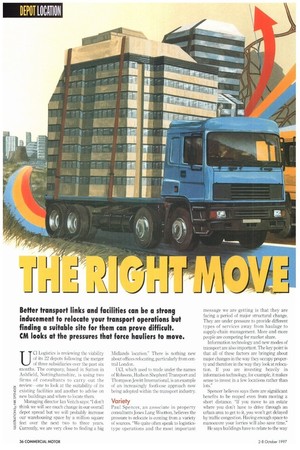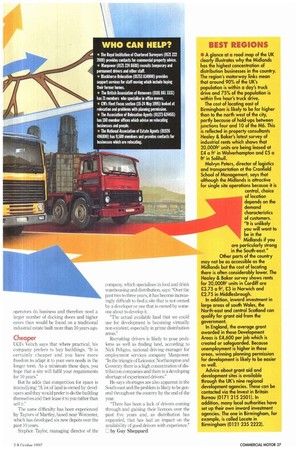U Cl Logistics is reviewing the viability of its 22 depots
Page 38

Page 39

If you've noticed an error in this article please click here to report it so we can fix it.
following the merger of three subsidiaries over the past six months. The company, based in Sutton in Ashfeld, Nottinghamshire, is using two firms of consultants to carry out the review—one to look at the suitability of its existing facilities and another to advise on new buildings and where to locate them, Managing director Ian Witch says: "I don't think we will see much change in our overall depot spread but we will probably increase our warehousing space by a million square feet over the next two to three years. Currently, we are very close to finding a big
Midlands location." There is nothing new about offices relocating, particularly from central London.
[JCL which used to trade under the names of Robsons, Hudson Shepherd Transport and Thompson Jewitt International, is an example of an increasingly footloose approach now being adopted within the transport industry.
Variety
Paul Spencer, an associate in property consultants Jones Lang Wootton, believes the pressure to relocate is coming from a variety of sources, "We quite often speak to logisticstype operations and the most important message we are getting is that they are facing a period of major structural change. They are under pressure to provide different types of services away from haulage to supply-chain management. More and more people are competing for market share.
Information technology and new modes of transport are also important. The key point is that all of these factors are bringing about major changes in the way they occupy property and therefore in the way they look at relocation. If you are investing heavily in information technology, for example, it makes sense to invest in a few locations rather than lots."
Spencer believes says there are significant benefits to be reaped even from moving a short distance. "If you move to an estate where you don't have to drive through an urban area to get to it, you won't get delayed by traffic congestion. Having enough space to manoeuvre your lorries will also save time."
He says buildings have to relate to the way operators do business and therefore need a larger number of docking doors and higher eaves than would be found on a traditional industrial estate built more than 10 years ago.
Cheaper
UC1's Veitch says that where practical, his company prefers to buy buildings. "It is certainly cheaper and you have more freedom to adapt it to your own needs in the longer term. As a minimum these days, you hope that a site will fulfil your requirements for 10 years."
But he adds that competition for space is intensifying: "A lot of land is owned by developers and they would prefer to do the building themselves and then lease it to you rather than sell ft."
The same difficulty has been experienced by Taylors of Martley, based near Worcester, which has developed six new depots over the past 10 years.
Stephen Taylor, managing director of the
company, which specialises in food and drink warehousing and distribution, says: "Over the past two to three years, it has become increasingly difficult to find a site that is not owned by a developer or one that is owned by someone about to develop it.
"The actual available land that we could use for development is becoming virtually non-existent, especially in prime distribution areas."
Recruiting drivers is likely to pose problems as well as finding land, according to Nick Peligno, national driving manager for employment services company Manpower. "In the triangle of Leicester, Northampton and Coventry there is a high concentration of d istribution companies and there is a developing shortage of experienced drivers."
He says shortages are also apparent in the South-east and the problem is likely to be general throughout the country by the end of the year.
"There has been a lack of drivers coming through and gaining their licences over the past five years and, as distribution has expanded, that has had an impact on the availability of good drivers with experience." E by Guy Sheppard








































































































